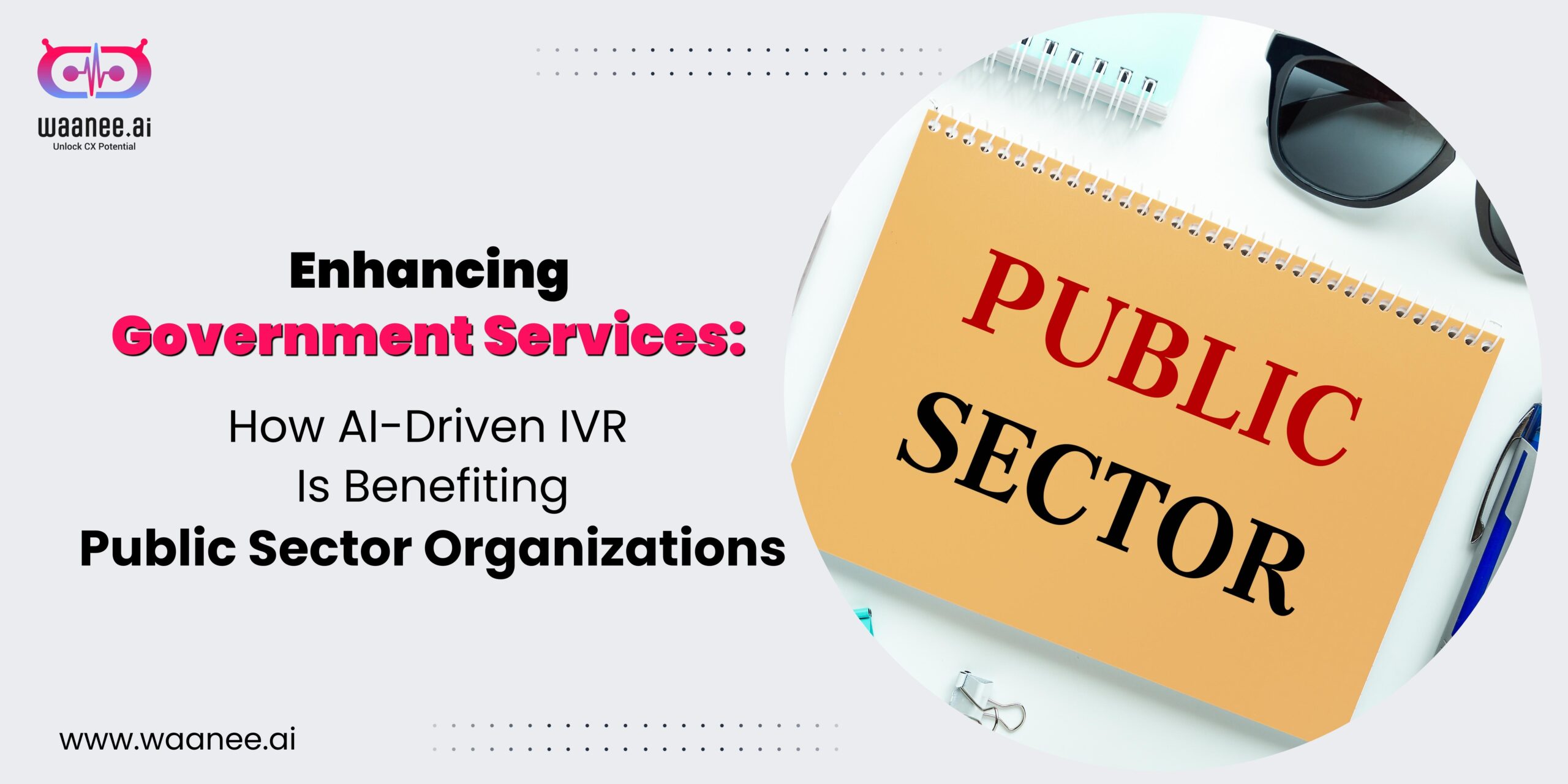
-
Waanee AI Labs
View All »

Get The Latest
Checklist: What to Look for in a Post-Call Audit Solution Before You Buy
Read More »Post-Call Audit vs. Traditional QA: A Side-by-Side Comparison
Read More »Intent-Based IVR vs. Traditional IVR: Which is Right for Your Business?
Read More » - Blog
Enhancing Government Services: How AI-Driven IVR is Benefiting Public Sector Organisations
Posted by info@waanee.ai, on 19 Jul, 2023 02:00 AM

Enhancing Government Services: How AI-Driven IVR is Benefiting Public Sector Organisations
Everyone has their own experience with the government contact center and the long recordings one has to hear before finding the right solution to their query. People always expect prompt and accurate information from support centers, be it private or public sector organizations. As technology is ever-changing and revolutionalizing at a fast pace, organizations have no choice but to use it.
Artificial Intelligence is one of the next big things humankind is witnessing. Advancements in artificial intelligence (AI) technology have impacted various industries, and businesses including the public sector. One area where AI has been particularly transformative is in the realm of interactive voice response (IVR) systems. In this blog, we explore how AI-driven IVR is enhancing government services, improving efficiency, increasing accessibility, and ultimately benefiting public sector organizations.
Streamlined Citizen Interactions:
Government agencies handle a vast number of citizen interactions on a daily basis, ranging from inquiries about services to processing applications and resolving issues. AI-driven IVR systems automate and streamline these interactions, leading to significant improvements in efficiency and service delivery.
AI-powered IVR systems can understand and respond to natural language queries, providing accurate information and guidance to citizens. These systems can handle routine inquiries, such as hours of operation or document requirements, freeing up human agents to focus on more complex issues. By reducing wait times and providing prompt and accurate information, AI-driven IVR enhances citizen satisfaction and ensures a smoother experience.
Personalized Citizen Assistance:
One of the key advantages of AI-driven IVR systems in the public sector is the ability to provide personalized citizen assistance. These systems can leverage data analytics and machine learning to analyze citizen profiles, preferences, and historical interactions. With this information, AI-powered IVR can offer tailored recommendations, services, and resources to each individual citizen.
By understanding citizen needs and preferences, IVR systems can guide citizens to the appropriate services and resources, ensuring a personalized and efficient experience. Whether it’s assisting with tax filings, providing information about government programs, or facilitating online transactions, AI-driven IVR systems can cater to each citizen’s unique requirements, promoting a more citizen-centric approach.
Improved Accessibility and Inclusivity:
AI-driven IVR systems play a crucial role in enhancing accessibility and inclusivity in government services. These systems provide alternative channels of communication for citizens with disabilities or language barriers, ensuring that all citizens can access and benefit from government services.
IVR systems equipped with speech recognition and natural language processing capabilities can understand and respond to diverse languages, enabling multilingual interactions. Additionally, voice-based interfaces are particularly beneficial for citizens with visual impairments or limited mobility, as they offer a more accessible means of engagement.
Data-Driven Decision-Making:
AI-powered IVR systems generate a wealth of data from citizen interactions, which can be invaluable for government agencies in making data-driven decisions. By analyzing this data, agencies can gain insights into citizen preferences, common issues, and service gaps, enabling them to make informed policy decisions and improve service delivery.
Data analytics can identify patterns and trends, allowing agencies to proactively address citizen needs and anticipate future demands. By harnessing AI-driven IVR data, governments can identify areas for improvement, allocate resources effectively, and enhance overall service quality.
Additionally, AI-powered IVR systems can provide real-time analytics and reporting, offering teams a comprehensive view of citizen interactions and performance metrics. This data empowers government organizations to continuously evaluate and optimize their services, ensuring they meet the evolving needs of citizens.
Conclusion:
By using AI-enabled IVR systems, government services have transformed citizen interactions, personalized assistance, and data-driven decision-making. These systems offer governments the opportunity to optimize their operations, improve service quality, and better citizen satisfaction.
As AI technology continues to advance, we can expect further enhancements in government services. AI-driven IVR systems hold great promise in creating efficient, citizen-centric, and inclusive public sector organizations. By embracing AI, governments can foster transparency, efficiency, and innovation, ultimately providing better services to their citizens and contributing to a more empowered and engaged society.
About Author
Mithun Ekbote
Marketing & Brand Consultant
Startup specialist. Marketing and Brand consultant. Monetization and revenue strategist.
Revolutionize CX
with AI power
Delivers personalized interactions and immediate, data-driven solutions powered by AI, transforming customer experiences.

We use cookies!
We use cookies to ensure that we give you the best experience on our website.
By continuing to use this site, you accept our use of cookies. Learn more
 Recruit Industries Agents
Recruit Industries Agents Build Your Agent
Build Your Agent Improve Self Service
Improve Self Service Employee Experience
Employee Experience Sales and Cross Sales
Sales and Cross Sales Calling Script
Calling Script Integration & APIs
Integration & APIs Auto Summarization
Auto Summarization Conversational Intelligence
Conversational Intelligence Sentiment Analytics
Sentiment Analytics Auto QA
Auto QA Net Promoter Score
Net Promoter Score